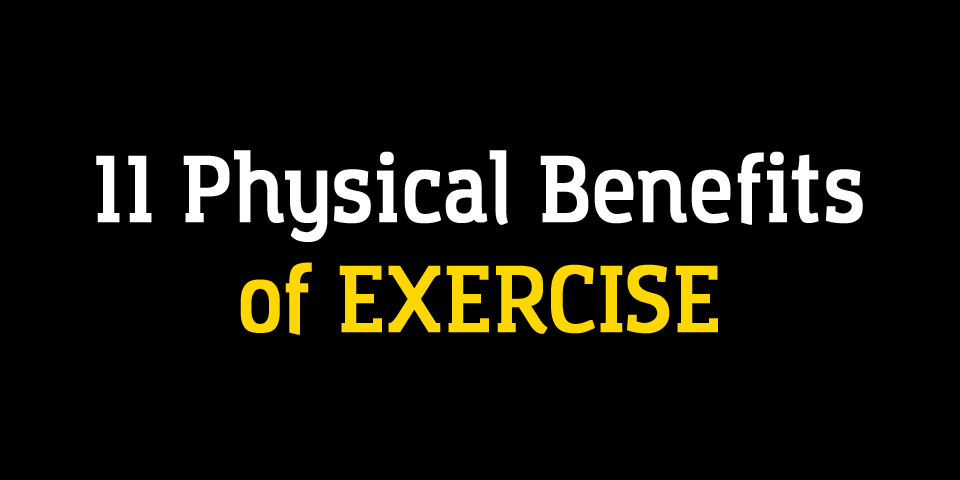Exercise physically improves our bodies. Might sound like common sense right? But not really. Here’s 11 physical benefits of exercise!
1. Your posture improves
Nothing says ‘time and effort in the gym’, like a great upright posture. This carries over from simple activities such as walking to certain exercises where posture is essential such as deadlifts. Most people have tight hips, abs and shoulders from remaining seated in bad positions for long durations. This can be fixed through core exercise and also changes in habits.
*Studies have shown that people with weak posture are more likely to have incidents of cardiovascular and pulmonary issues. A study on women who’s heads were pushed forwards showed a 1.4 times more likely chance of death than those whose posture was aligned.
2. Your body composition will improve
There aren’t many people around apart from sumo wrestlers who are too happy with fat on their bodies. Exercise will help to build stronger bones, build muscle tissue and reduce fat. If you’re doing it correctly that is. Thus improving your overall body composition, this will give you that confidence needed to fit into your favourite clothes better.
*Studies have linked low muscle mass, especially when accompanied by high body fat, with disease risk. So, body composition, rather than weight alone, is a better indicator of health.
3. Your muscle tone will increase
Muscle has many benefits, for one, the more muscle your body carries, the more calories you will burn even at rest. Besides your cleverly organised cardiovascular work you should pick out a simple weights/resistance plan to help build muscle. They look great too!
*A 2004 study of over 3000 people published by the American Journal of Medicine showed older adults with higher levels of muscle had less chance of death. So muscles aren’t just great for summer.
4. Increased blood flow
It is important to exercise and keep active as much as possible in this day and age, especially with the emergence of gadgets and technologies which keep us occupied for hours on end. Exercise or just simply getting up for a walk every hour can help blood circulate around your body and freshen your mind and body.
*A weight-watchers survey from 2012 shows that the average British person spends around 20 hours a day sedentary, either sitting or lying down.
5. Stronger heart
Exercise isn’t just about improving what we see on the outside, it has a whole host of internal boosting properties too! The main one including efficiency of the circulatory system. Exercise can reduce bad cholesterol, reduce blood pressure and increase heart pump strength. Let’s not forget the heart itself is a muscle, and gets stronger with working out. Using less force to pump the same amount of blood (reduced blood pressure and lower beats too).
*Regular exercise helps keep veins and arteries elastic (flexible). This, in turn, ensures good blood flow and normal blood pressure. Sedentary people have a 35% greater risk of developing high blood pressure than physically active people do.
6. Stronger, denser bones – Avoid osteoporosis
The idea behind muscular hypertrophy is that you train and create micro-tears in your muscles, which then respond by reforming you muscle cells (stronger and bigger than before) to cope with the additional load.
*This also applies to bones as well. Wolff’s law states that your bones change their form and structure depending on the loads placed upon it. A literal version of the old saying, ‘what doesn’t kill you makes you stronger’.
7. More brain power
On a more personal note. On days where you’ve exercised early in the morning, have you felt you complete significantly more work and are more productive than on rest days?
*Studies have shown that a tough workout can increase levels of BDNF (brain derived neurotrophic factor). This has been linked to decision making, higher thinking and learning.
8. Your lungs become more efficient
A term commonly used to track the performance of athletes is VO2 max. VO2 max is basically the maximum volume of oxygen your body utilizes during exercise. It is a very reliable indicator of aerobic endurance and training can improve it by up to 20%.
*High intensity interval training especially, can improve your VO2 max more than other forms of cardio.
9. Your will sleep will improve.
Exercise is proven to be an effective alternative to sleeping pills for people with insomnia (minus the side effects).
*Exercising 5-6 hours before you sleep has the most positive impact. It raises your core body temperature which will start falling as you’re getting ready for bed, which appears to be a trigger that eases you into sleep.
10. Improved sex life
Exercise can balance your hormones. It releases endorphins which reduce your cortisol levels. It also increases testosterone (the male sex hormone) which can significantly improve your libido.
*Also, in a study of people who exercised 4-5 days per week, 88% of the women and 69% of the men reported their own sexual performance as above average.
11. It will make your bowel movements more efficient
Aerobic exercise increases your breathing and your heart rate. This helps to stimulate the natural contraction of your intestinal muscles.
*For your digestive system, it is best to exercise one hour after eating a big meal (or ideally before). Exercising on a full stomach is never recommended as it can lead to constipation, bloating and gas.


